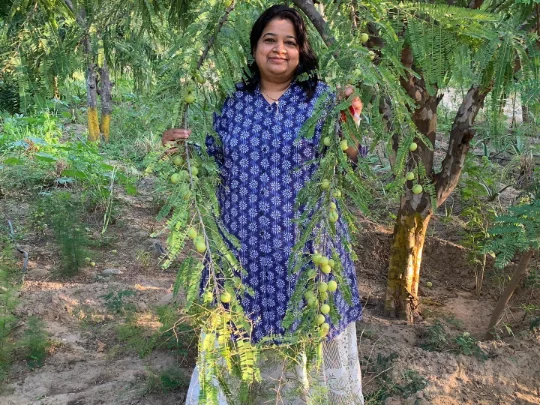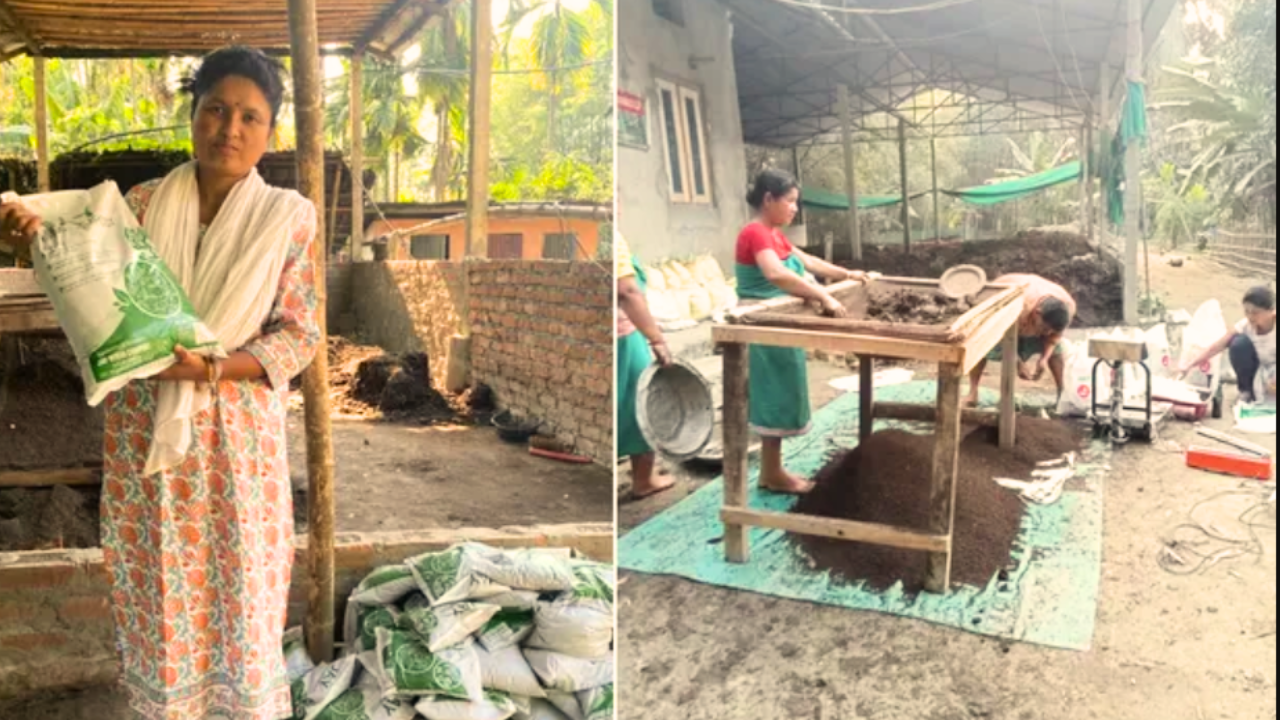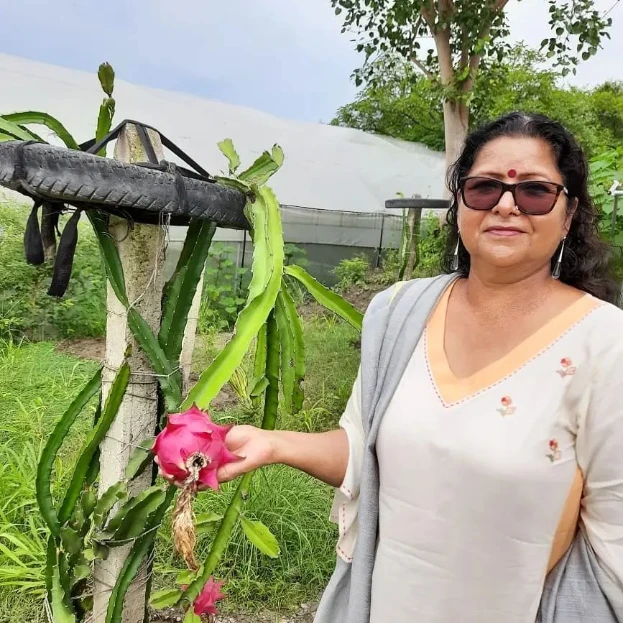In the vicinity of Pune, lies Bhodani village, home to an exuberant organic farm brimming with fertile soil nutrients. Overseeing this verdant expanse are two siblings, Satyajit Hange (39) and Ajinkya Hange (36), who have transitioned from their roles as bankers to cultivate their own agricultural haven, named Two Brothers Organic Farm (TBOF), in 2014. Despite their upbringing with a farming background, their engagement with farming was delayed until adulthood. The brothers pursued their educational journey from early childhood to graduation in Pune, during which they also spent several years working. Holding an MBA from Pune University, Satyajit spent two hours commuting to the office and nine hours confined within a cubicle, engaged in the task of vending products to customers. This routine left him with an internal void. Ultimately, it was during this period that they found their true vocation in the realm of farming.
Satyajit says, “In our early years, the prospect of agriculture as a financially rewarding path was not enticing, leading us to pursue education outside our village. Nonetheless, our visits to the family farm during holidays kindled a nascent fascination for agriculture within us.”
The profound satisfaction derived from farming kindled an unquenchable passion within the brothers. This fervor led them to abandon their banking professions in favor of tilling the land, motivated solely by their ardor for farming. From elation to an abiding enthusiasm, the siblings gleaned insights from their colleagues on the farm, revealing a stark decline in agricultural productivity.
“Prior to commencing our expedition, we recognized the decrease in crop productivity on numerous farms, predominantly linked to the decline in soil fertility and the widespread use of inorganic farming methods. Furthermore, the diminishing water supply and a scarcity of skilled labor were compounding challenges,” elucidates Satyajit. “Although we possessed knowledge about organic farming, its practical implementation within our surroundings was sparse. This prompted us to engage with farmers throughout India who were pioneering unconventional farming approaches,” he adds.
While pockets of organic farming were practiced in isolated regions across the country, these endeavors were seldom economically viable. “Upon realizing the detrimental impact of chemical fertilizers, we promptly ceased their use. Instead, we reverted to the age-old practice of employing cow dung as a natural fertilizer for our plants,” Satyajit affirms.
Cow dung, a traditional form of manure, is essential for enriching the soil with both micro and macro nutrients. In addition, farmers utilized organic waste as mulch to enhance soil fertility. Unlike monocropping, which leads to the depletion of specific nutrients, embracing polyculture aids in bolstering soil fertility, improving soil particle size, boosting water retention capacity, and ultimately fostering greater farm biodiversity.
Satyajit, the visionary behind this transformation, explains, “We embarked on poly-cropping experiments, and now our farm flourishes as a food forest, hosting a diverse array of fruits, vegetables, and around 25 to 30 varieties of plants, including medicinal species.”
Grasping market dynamics
Gaining insights into market dynamics, their initial experimentation included papaya cultivation. Satyajit recalls that despite the fruit’s unappealing exterior, its taste was delightful. However, challenges arose as the market judged their produce based on its outward appearance. “In response, we established our brand TBOF, ventured into retail spaces, and eventually ventured into the online market,” Satyajit articulates.
After persistent trials and errors over four years, the brothers devised a successful model. They cultivated indigenous seeds and formulated their own fertilizers and pesticides, which substantially curtailed their farming expenses. “Our agricultural products achieved market rates that were three to four times greater than the prices seen in the local market. By means of community and non-profit initiatives, we raised awareness about the significance of organic products. This effort not only elevated the perception of our produce in the market but also influenced neighboring farmers,” Satyajit concludes.
Creating an impact
In a story of positive change, TBOF experienced a growing number of visitors and farmers not only from India but also from 14 different countries. These people came to observe how TBOF carries out its farming activities. Even the government of Maharashtra sent farmers from various parts of the country to learn from TBOF’s farming practices. Over the past six to seven years, Satyajit and Ajinkya, the two individuals behind TBOF, have taken on the role of trainers, imparting their knowledge of organic farming to more than 9,000 farmers.
They go beyond just teaching – they personally visit these farmers’ lands to evaluate their methods and offer advice on how they can enhance their produce. The brothers have gone a step further by uniting farmers around their village and assisting them in converting their farms into organic ones. They’ve even extended their support to aid in marketing these farmers’ organic products.
Satyajit and Ajinkya explain, “After certifying these farmers through our training program, we collected their produce and tested it within our network. The compensation we provided to the farmers was significantly higher, around 35 to 50 percent, compared to what they would have earned selling the same produce elsewhere.”
TBOF has also partnered with OrganicWe, a nonprofit organization that offers a platform for organic farmers to showcase and sell their produce. Through this collaboration, they launched an initiative called ‘Project 100 Organic Farmers’ aimed at promoting sustainable farming practices while ensuring farmers receive sustainable incomes. In addition, they have organized various gatherings and sessions for farmers, educating them about the significance and benefits of embracing organic farming.
Financing and revenue
“We commenced by vending our organic fruits using hand carts, raising awareness about the significance of organic produce. During this phase, our clientele began to expand. We’ve reached out to approximately 45,000 customers spanning across more than 34 nations and 664 cities globally, in addition to our presence in India,” Satyajit remarks.
No intermediaries are involved; all transactions occur online, and items are dispatched within four to five days following order placement.
“In 2016, our yearly revenue amounted to $2500. Presently, we’re observing an average turnover of roughly $2 Million annually. Our journey has been quite remarkable,” Ajinkya explains. He underscores their primary focus on creating items with extended shelf life, reminiscent of traditional practices, such as nutritionally dense ghee, jaggery, moringa powder, along with a distinct immunity-boosting powder developed in collaboration with nutritionist Luke Coutinho. “Our product range encompasses around 24 offerings, including peanut butter, groundnut oil, traditional wheat flour, assorted jowar varieties, and nutritionally enriched rice,” Ajinkya adds.
Creating a worldwide direct-to-consumer (D2C) brand
Today, the two brothers behind the brand are successfully selling their products all across India and even shipping them to approximately 45 different countries. Some of the major international markets for their brand, The Brothers Organic Farm (TBOF), include the United States, New Zealand, Singapore, the Middle East, and Australia. They’ve managed to reach customers in over 680 cities. Initially, they began by selling their products on Shopify, but now they have expanded to selling through their own website as well as popular online marketplaces like Amazon and Flipkart.
Satyajit, one of the brothers, reveals that their website attracts twice as many customers as the products listed on other online platforms. Despite this, they are cautious about spending too much time on these platforms due to concerns about intermediaries. However, they acknowledge that some customers still prefer shopping on Amazon, so they have chosen to make their products available there.
Their success can be attributed to their strong focus on social media. Satyajit emphasizes the importance of social media in building interest and driving traffic to their website. On their social media channels, Two Brothers Organic Farm shares blogs, videos showcasing their activities, and various types of posts. The brand has also partnered with schools in Pune to establish ‘Organic Farming Clubs,’ through which they have trained around 9,000 farmers in different organic farming techniques, making a significant positive impact.
Competitors and the distinctive feature of the brand
As per the findings by IMARC Group, the Indian market for organic food is expected to expand remarkably by around 24 percent each year from 2021 to 2026. In India, you can find a variety of organic food brands such as Organic India, Organic Tattva, Dabur, Patanjali, Pro Nature Organic Foods, and more.
Satyajit, however, remains undisturbed by the presence of competitors. He confidently states, “Most of the other brands out there simply bring together products. There isn’t a single brand that is directly run by a farmer or possesses comprehensive knowledge about farming.” Satyajit and Ajinkya emphasize that their upbringing around farming gives them a unique insight into the agricultural domain, surpassing that of their rivals.
Moving forward by harnessing technology.
Moving ahead, Satyajit expresses their intentions to use technology for a significant transformation in the agricultural sector, which currently requires new ideas and technological improvements. The company is even working on creating a specialized weather station for fields. This station will have a SIM card and will keep track of various factors like moisture levels, wind speed, and pest threats. All these updates will be sent to the TOBF team members’ mobile phones. The company’s future plans involve incorporating ERP systems into their daily operations, enabling them to make well-informed decisions using intelligent data analysis.
Furthermore, both Satyajit and Ajinkya are motivated to challenge the common belief among young individuals that a career in farming isn’t financially rewarding. They also have an ambitious goal of having their company listed on the New York Stock Exchange, questioning why technology companies have that opportunity while agricultural ventures don’t.
Satyajit emphasizes this sentiment: “If numerous IT companies can go public, then why shouldn’t a company focused on farming?”
Going forward
Lately, the TBOF team has allocated stocks valued at nearly half a million dollars among their staff members, ranging from those responsible for tending to the cows to the drivers. This initiative has resulted in every individual involved in the chain becoming a stakeholder.
“Those involved in agricultural activities have shown a strong inclination towards embracing organic farming methods, resulting in their ability to sustain themselves through independent farming efforts. Our forthcoming plan involves the establishment of a farmer training center, aimed at equipping them with the skills needed to cultivate and process diverse crops effectively.”
Furthermore, the siblings are actively developing a technological solution designed to furnish farmers with essential data concerning rainfall, light intensity, wind patterns, and other relevant factors. This information will be gathered through an array of sensors integrated into the device. Satyajit elaborates, “Through our emphasis on organic farming, we are not only facilitating the growth of the local community but also championing regional biodiversity. Our overarching objective is to empower local farm.
Satyajit identified his notable achievements as Prime Minister Narendra Modi’s recognition of their enterprise in Mann Ki Baat, their recognition as India’s top organic farming brand by Vogue, and their appointment as India brand ambassadors by Facebook. Their triumph caught the attention of the Indian Institute of Management Ahmedabad (IIM-A), leading them to extend an invitation for the brothers to share their journey with the students.







